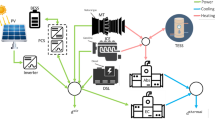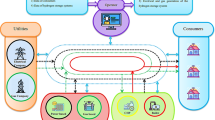Abstract
The short-term hydrothermal scheduling (SHS), typically a complicated nonlinear, nonconvex and non-smooth optimization problem, is very important for the economic operation of power systems. Instead of heuristic algorithms popularly used in previous studies, this paper employs a mathematical approach, where a two-stage linear programming with special ordered sets (TLPSOS) is proposed to solve the SHS problem. The nonlinear thermal cost functions and hydropower output functions are approximated by using the special ordered sets. The TLPSOS involves two stages: solve the linearized model in the first stage, and eliminate the linearization errors in the second. Superior to heuristic algorithms, the TLPSOS does not rely on parameters, and can always give stable results. Applied to a widely used hydrothermal system which consists of four hydroplants and three thermal plants, the present method shows its efficiency and strength in obtaining results better than those of previous studies.




Similar content being viewed by others
References
Ahmadi A, Nezhad AE (2015) Comment on “Short-term combined economic emission scheduling of hydrothermal power systems with cascaded reservoirs using differential evolution” by K.K. Mandal and N. Chakaborty [Energy Convers. Manage. 50 (2009) 97–104]. Energy Convers Manag 93:452–455. doi:10.1016/j.enconman.2015.01.045
Amjady N, Soleymanpour HR (2010) Daily hydrothermal generation scheduling by a new modified adaptive particle swarm optimization technique. Electr Power Syst Res 80(6):723–732. doi:10.1016/j.epsr.2009.11.004
Babayev DA (1997) Piece-wise linear approximation of functions of two variables. J Heuristics 2(4):313. doi:10.1007/BF00132502
Beale EML, Forrest JJH (1976) Global optimization using special ordered sets. Math Program 10(1):52–69. doi:10.1007/BF01580653
Beale EML, Tomlin JA (1970) Special facilities in a general mathematical programming system for non-convex problems using ordered sets of variables. Math Methods Optim
Bhattacharjee K, Bhattacharya A, Halder Nee Dey S (2014) Real coded chemical reaction based optimization for short-term hydrothermal scheduling. Appl Soft Comput 24:962–976. doi:10.1016/j.asoc.2014.08.048
Fang N, Zhou J, Zhang R, Liu Y, Zhang Y (2014) A hybrid of real coded genetic algorithm and artificial fish swarm algorithm for short-term optimal hydrothermal scheduling. Int J Electr Power Energy Syst 62:617–629. doi:10.1016/j.ijepes.2014.05.017
Gacem A, Benattous D (2014) Hybrid genetic algorithm and particle swarm for optimal power flow with non-smooth fuel cost functions. Int J Syst Assur Eng Manag. doi:10.1007/s13198-014-0312-8
Gouthamkumar N, Sharma V, Naresh R (2015) Disruption based gravitational search algorithm for short term hydrothermal scheduling. Expert Syst Appl 42(20):7000–7011. doi:10.1016/j.eswa.2015.05.017
Gurobi Optimization (2016) Mixed-Integer Programming (MIP) basics http://www.gurobi.com/resources/getting-started/mip-basics. Accessed 01 May 2016
Haghrah A, Mohammadi-ivatloo B, Seyedmonir S (2015) Real coded genetic algorithm approach with random transfer vectors-based mutation for short-term hydro-thermal scheduling. IET Gener Transm Dis 9(1):75–89. doi:10.1049/iet-gtd.2014.0322
Hota PK, Barisal AK, Chakrabarti R (2009) An improved PSO technique for short-term optimal hydrothermal scheduling. Electr Power Syst Res 79(7):1047–1053. doi:10.1016/j.epsr.2009.01.001
Lakshminarasimman L, Subramanian S (2006) Short-term scheduling of hydrothermal power system with cascaded reservoirs by using modified differential evolution. IEE Proc Gener Transm Distrib 153(6):693–700. doi:10.1049/ip-gtd:20050407
Lakshminarasimman L, Subramanian S (2008) A modified hybrid differential evolution for short-term scheduling of hydrothermal power systems with cascaded reservoirs. Energy Convers Manag 49(10):2513–2521. doi:10.1016/j.enconman.2008.05.021
Liao X, Zhou J, Ouyang S, Zhang R, Zhang Y (2013) An adaptive chaotic artificial bee colony algorithm for short-term hydrothermal generation scheduling. Int J Electr Power Energy Syst 53:34–42. doi:10.1016/j.ijepes.2013.04.004
Mandal KK, Basu M, Chakraborty N (2008) Particle swarm optimization technique based short-term hydrothermal scheduling. Appl Soft Comput 8(4):1392–1399. doi:10.1016/j.asoc.2007.10.006
Mandal KK, Chakraborty N (2008) Differential evolution technique-based short-term economic generation scheduling of hydrothermal systems. Electr Power Syst Res 78(11):1972–1979. doi:10.1016/j.epsr.2008.04.006
Mandal KK, Chakraborty N (2013) Parameter study of differential evolution based optimal scheduling of hydrothermal systems. J Hydro Environ Res 7(1):72–80. doi:10.1016/j.jher.2012.04.001
Nezhad AE, Ahmadi A (2015) Comment on “an improved quantum-behaved particle swarm optimization method for short-term combined economic emission hydrothermal scheduling” by Songfeng Lu et al. [energy Convers. Manage. 51 (2010) 561–571]. Energy Convers Manag 96:646–648. doi:10.1016/j.enconman.2015.03.005
Nguyen TT, Vo DN, Truong AV (2014) Cuckoo search algorithm for short-term hydrothermal scheduling. Appl Energy 132:276–287. doi:10.1016/j.apenergy.2014.07.017
Padberg M (2000) Approximating separable nonlinear functions via mixed zero-one programs. Oper Res Lett 27(1):1–5. doi:10.1016/S0167-6377(00)00028-6
Rasoulzadeh-akhijahani A, Mohammadi-ivatloo B (2015) Short-term hydrothermal generation scheduling by a modified dynamic neighborhood learning based particle swarm optimization. Int J Electr Power Energy Syst, 67, 350-367. doi: 10.1016/j.ijepes.2014.12.011
Wang Y, Zhou J, Mo L, Zhang R, Zhang Y (2012) Short-term hydrothermal generation scheduling using differential real-coded quantum-inspired evolutionary algorithm. Energy 44(1):657–671. doi:10.1016/j.energy.2012.05.026
Zhang J, Wang J, Yue C (2012) Small population-based particle swarm optimization for short-term hydrothermal scheduling. IEEE Trans Power Syst 27(1):142–152. doi:10.1109/TPWRS.2011.2165089
Acknowledgements
This paper is supported by the National Key Research and Development Program of China (2016YFC0401910).
Author information
Authors and Affiliations
Corresponding author
Ethics declarations
Conflict of Interest
The authors declare that they have no conflict of interest.
Rights and permissions
About this article
Cite this article
Kang, C., Guo, M. & Wang, J. Short-Term Hydrothermal Scheduling Using a Two-Stage Linear Programming with Special Ordered Sets Method. Water Resour Manage 31, 3329–3341 (2017). https://doi.org/10.1007/s11269-017-1670-1
Received:
Accepted:
Published:
Issue Date:
DOI: https://doi.org/10.1007/s11269-017-1670-1




